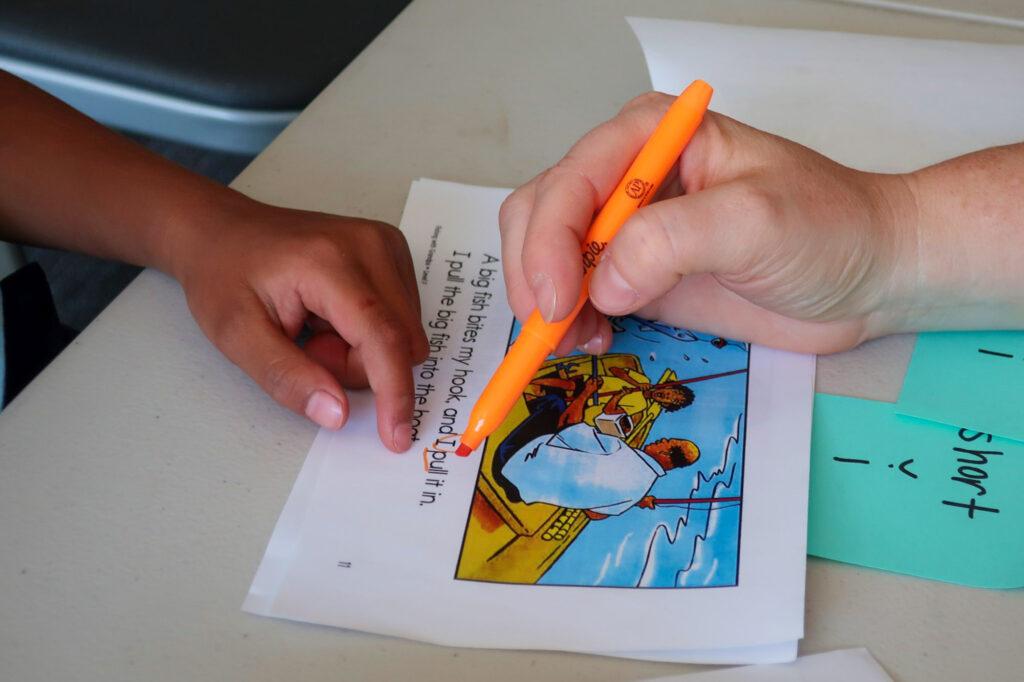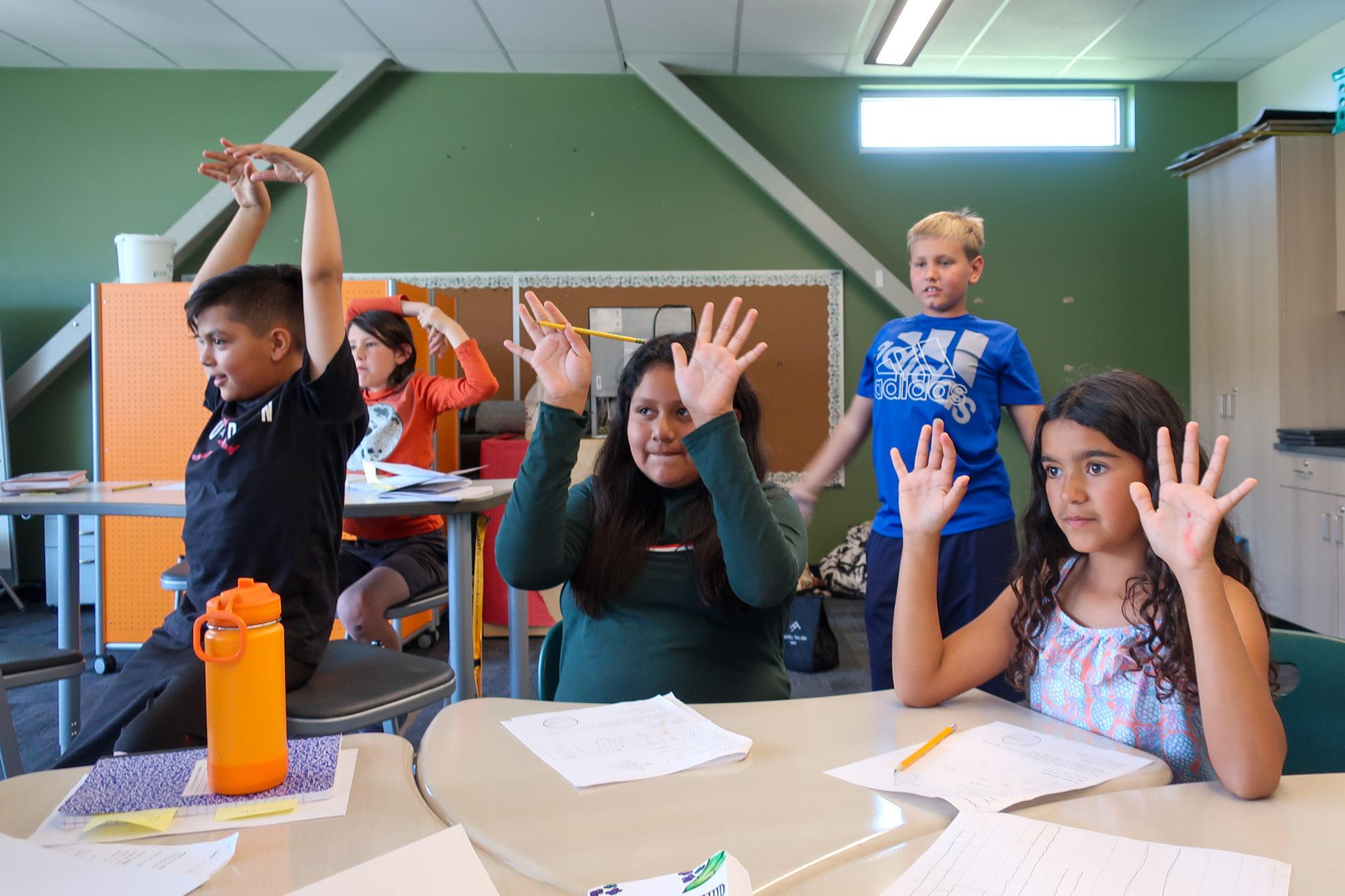
It’s a hot summer day in the Colorado mountains.
But there are three boys who are not outside in the sunshine. Rather, they’re huddled around a table in a cool room at Eagle Valley Elementary. They’re trying to figure out the area of a circle — using their powers of deduction.
They look at the length of the sides of a nearby square and then look back at the circle.
“Two inches? It might be this,” one suggests. “Probably one inch,” suggests another.
Never fear, the summer teacher, Paul Witt, is here.
“So, remember our formula is ?, that funky number, 3.14, times the radius … radius is the measure of the center of the circle to the outside, then we have to calculate the radius times itself,” explains Witt, who also teaches math during the regular school year.
These boys, going into fifth grade next fall, are in summer camp, one heavily tinged with academics, an increasingly common sight across Colorado after years of pandemic interruptions, isolation and online learning placed a sizable number of students behind academically. Ninety-three of the state’s 178 districts have budgeted federal COVID-19 funds for learning this summer.
The boys smile broadly when they learn about ?, excited for this "secret" piece of information that unlocks answers. "Surface area" is actually a concept they may not learn until seventh grade. Witt keeps summer camp interesting — doing review exercises for those who need to catch up — but also introducing new concepts to build confidence.
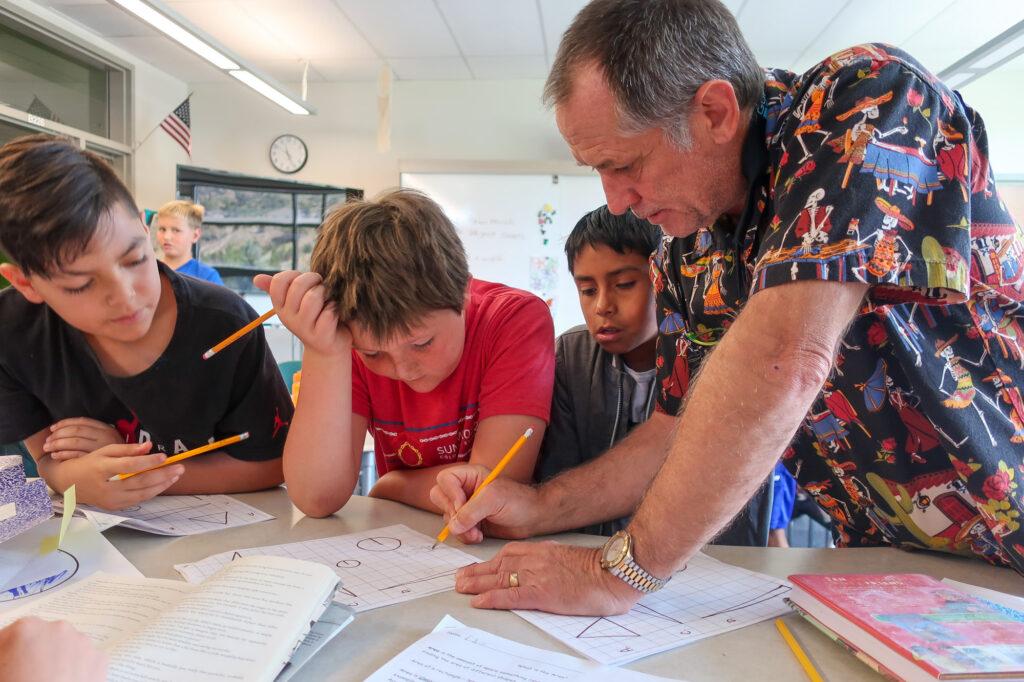
Summer camp is helping students catch up after the pandemic set them back
He noticed the pandemic caused students to lose basic foundational skills — like multiplication facts, or remembering how to carry or borrow numbers when adding or subtracting. Not having easy access to peers also slowed learning.
“Kids learn from each other and help each other out just as much as the teachers do sometimes, and I think they missed that whole piece as well,” said Heidi Press, one of the district's special education coordinators.
For 10 days — or 20 if they sign up for two summer sessions — students in the mountainous Eagle County School District that covers towns like Minturn, Gypsum and Beaver Creek are brushing up on skills lost during the pandemic and learning new ones. School officials say literacy suffered the most during the pandemic — they’re seeing the biggest impacts on current second and third graders.
But 10-year-old Mariana Gonzalez Diaz said reading wasn’t a problem for her.
“On reading, I like to read, but I really struggled with math because I’m like, 'I don’t get these stuffs!' she exclaims. “Sometimes in school maybe I would still struggle but I feel like summer school really helps me to learn a lot about more things.”
Her friend Scarlett Soto, 11, adds: “Next year, I’m probably going to be doing much better.”
Students who need additional one-on-one support can get it at this camp.
“Last year because of COVID we had kids with huge deficits in their learning — we wanted to make sure we had as many students as possible,” said Melisa Rewold-Thuon, a district assistant superintendent.
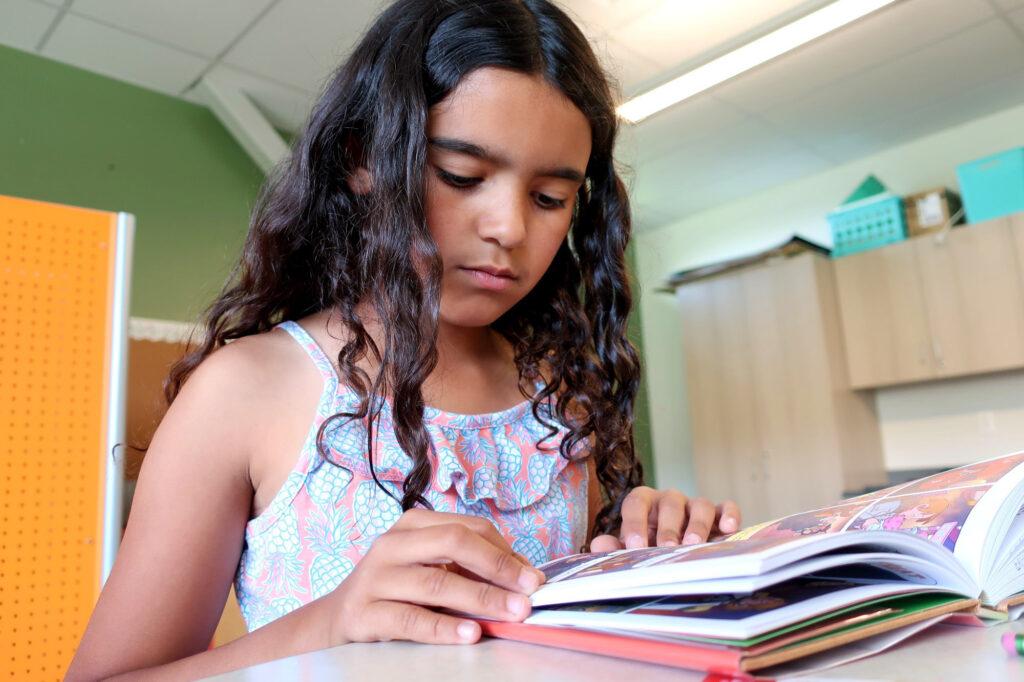
Partnering with a nonprofit helps the camps get more bang for their buck
Summer camps for elementary, middle and high school students this year will cost the district about $416,000. But an additional $753,000 comes from a partnership with the YouthPower365, an education initiative of the Vail Valley Foundation. The organization has partnered with the district for summer camps for a decade, but the post-pandemic camps took on a greater significance.
About 600 students signed up for this year’s camps. Rewold-Thuon credits the well-known YouthPower365, which relies almost entirely on donations. The nonprofit runs preschool and afterschool programs and internships for area youth. More than half of Eagle County district’s students are students of color; more than a third are English language learners.
“There’s a ton of trust with the families and so sometimes when the families are afraid of an institution, possibly like some of our families may have immigration or other sorts of concerns, they’re not afraid to engage with the nonprofit,” Rewold-Thuon said.
YouthPower365 reached out to families personally if the school was having problems getting students enrolled. They targeted students who’d struggled academically, and those who might otherwise not be able to attend a camp.
“Eighty percent of kids this summer will pay absolutely nothing at all to be part of the camp,” said Sara Amberg, executive director of YouthPower365.
The district and YouthPower365 tweaked the program this year, to meet the high level of need among students. The district used federal COVID-19 funds to hire reading and math specialists for more intensive one-on-one support.
Amanda Ballentine is one of those. Typically a special education teacher, she meets with students individually throughout the day for additional support. One morning, she helped two boys read a book about fishing with grandpa. They’re working on vowel sounds, sight words and making predictions to help them develop into more fluent readers.
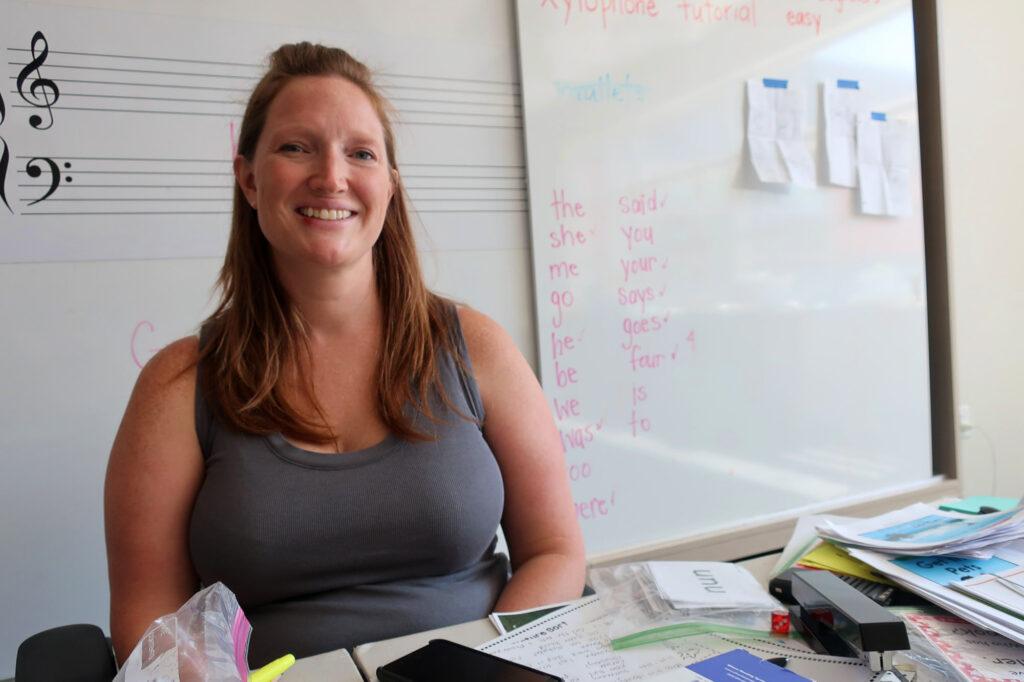
“Grandpa and …” one boy read. Ballentine gently interrupts and offers a hint, making the sound for the letter “p” three times.
“P. p. P … pon …” the boy tried.
“Puts,” said Ballentine, “… puts a … what does he put?”
“A worm!” said the boy.
Each child has been monitored throughout the school year, so the summer teachers know where each student’s deficiencies are and where they need to grow.
This year, the summer school attracted much more experienced teachers like Ballentine. One reason? Teacher pay was bumped to $40 dollars an hour. YouthPower365 pays three-quarters of the wage — along with transportation, lunch and snacks — the district covers the rest. But there were other reasons Ballentine took the summer gig.
“I just love to work in the summer, It’s the same as the kids, if you don’t keep it up, you kind of forget about it,” she laughed. “Otherwise it makes the beginning of the school year so much harder.”
In addition, for the first time this year, Eagle County students with more significant needs, those with special education plans, are part of the summer camp with other kids.
"It's a true integration model," said the district’s Rewold-Thuon.
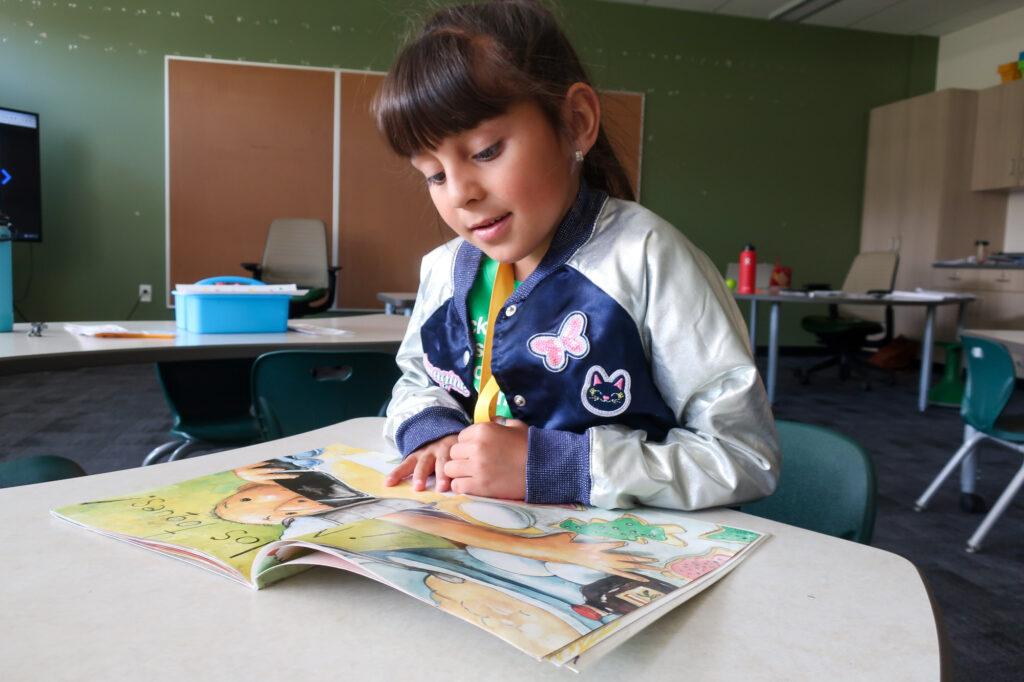
Summer camp is more than stopping the summer slide
Teachers are trying to expose the kids to art, language and outdoor activities, “but also what can we do to make it fun and make school enjoyable, you know, I brought my own books from home, to be like ‘These are my favorite to read,’ … let’s just foster a love of learning and reading,” Ballentine said.
Ximena Carrillo, 7, loves reading about mammals — all animals, in fact. She’s spending a lot of time soaking up the books in English and Spanish in her summer camp classroom. Carrillo her own reasons for attending summer school.
“’Cause I didn’t want my reading to go down,” she said.
She pauses, when asked how she thinks about how camp will help her in second grade.
“I think it will help me concentrate,” she said.
Her second-grade literacy teacher Saira Hernandez says the class size of 13 (“It’s a dream,” she said.), and the more imaginative summer curriculum makes it easier to have an impact on each student. This year’s theme is dragons. It’s not as rigorous and structured as the regular school year.
“I want them to see they’re still learning but they’re having fun,” Hernandez said.
At any given time, about five of her students are pulled out of class for more specific one-on-one support. Her students will start second grade next year.
“Some of them are (academic level) still at the end of kindergarten, maybe at the beginning of first grade,” Hernandez said. “Some of them you can tell they were exposed to books at home (during the pandemic), but the majority, not much.”
Fourth- and fifth-grade math teacher Paul Witt has noticed another pandemic impact — a drop in perseverance. He said learning at home made it easy for kids to say, “I can’t do it. Whereas in the classroom, there’s both peer pressure and some teacher pressure to keep working and keep trying.”
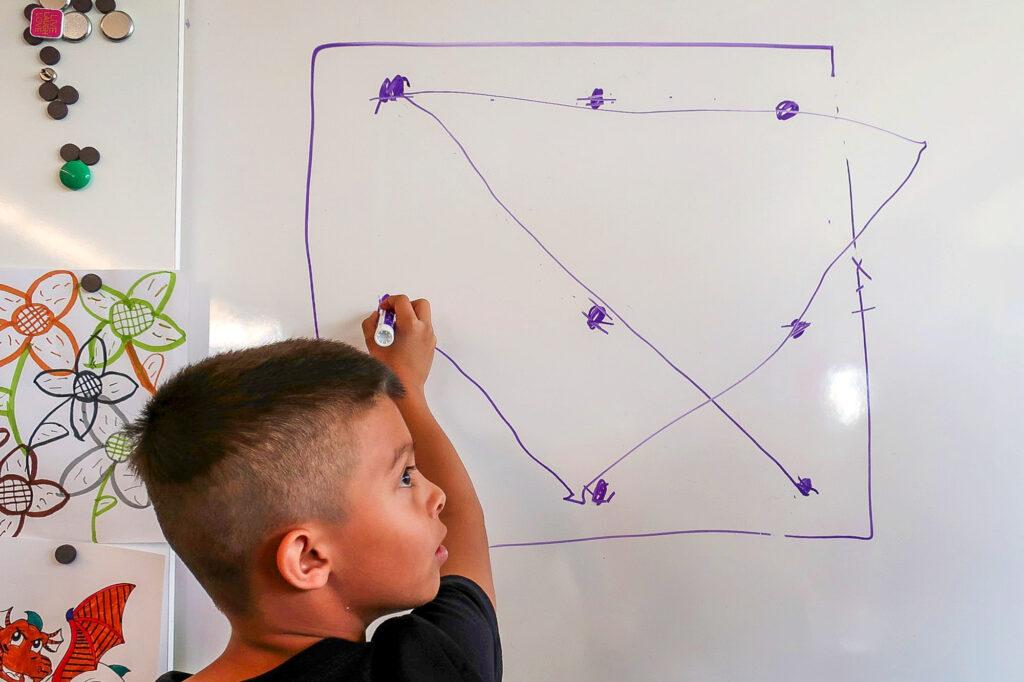
Oscar Lopez, 9, is an example of that. It’s free time now in math class. He’s at the whiteboard trying an age-old math brain-teaser: Join nine dots with four straight lines without lifting the pen. He’s been trying since the start of summer camp.
“I think I did it, I did it!” he shouts.
“You did?” asks Witt. “Yes!” said Lopez.
Ahh … but it turns out he missed one dot accidentally smudged off the board.
“You’re so close,” said Witt sympathetically, giving him a hint to “think outside the box.”
Lopez vows to keep trying that night at home.
